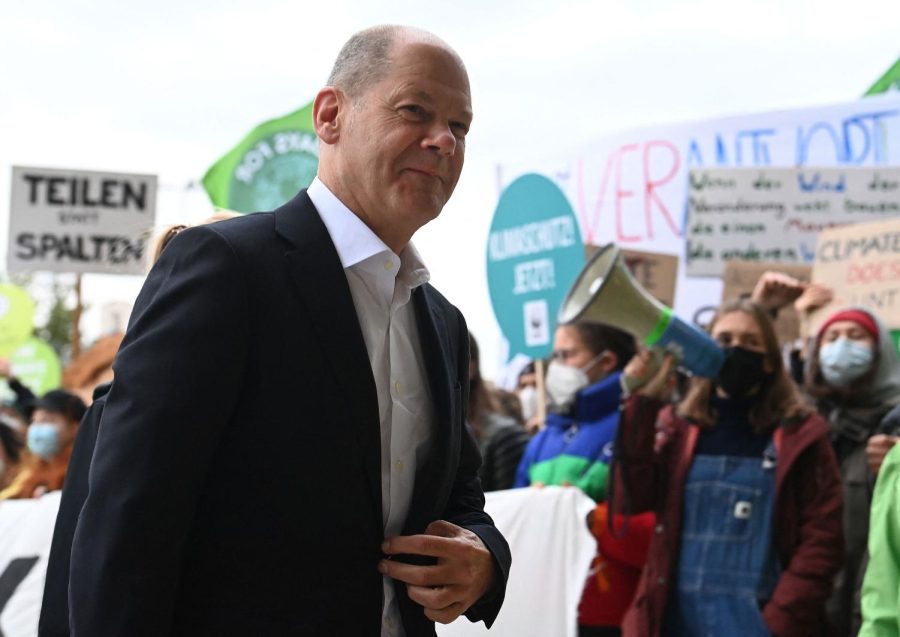Opinion | EU must embrace progressive turn | I
Photo Courtesy of Christof Stache/AFP/Getty Images/TNS
German Finance Minister, Vice-Chancellor and the Social Democratic Party’s candidate for chancellor Olaf Scholz arrives for a session of exploratory talks with leading members of the social democratic SPD party, the Greens and the free democratic FDP party in Berlin, Germany on Oct. 15. Columnist Eddie Ryan believes that it is important that the European Union must take a progressive turn and that Scholz might be able to help.
November 1, 2021
A prerequisite for understanding the European Union is knowing its primary player, Germany. With the country’s recent elections, it seems appropriate to evaluate former Chancellor Angela Merkel’s reign and to gauge what this means for the EU.
Since 2005, Merkel has sat at the helm of Germany and also of Europe; some even dubbed her the true leader of the free world during Donald Trump’s term. Her party, the center-right Christian Democratic Union, has thus influenced Europe’s affairs for most of the 21st century.
The tide has now turned leftward, but it’s worth asking how much so. German voters recently gave the Social Democratic party the most seats in Parliament, leaving its leader Olaf Scholz to accede to the chancellery.
The German Social Democrats, or SPD, are a center-left party. That they aren’t very radical in the European political context might surprise those who hold the standard American conception of socialism. In fact, European social democrats tend to offer fairly mild policies that leave much to be desired in the way of aggressive action.
That said, Scholz’s policies are generally sensible and align closely with Joe Biden’s progressive agenda. Scholz wants to raise taxes on the wealthy significantly, build a substantial amount of affordable housing and at least attempt to address climate change.
Get The Daily Illini in your inbox!
This approach differs enough from his opponent’s to warrant some optimism. Armin Laschet, Merkel’s heir-apparent and leader of the Christian Democratic Union, opposed all high-end tax increases and lacks Scholz’s vision on infrastructure.
Regrettably, because a German governing coalition must form before Scholz can get started, the conservative program could still hover over his tenure. This coalition will probably include some combination of the conservatives, left-wing Green Party members and corporate Free Democrats.
The SPD hopes to ally with the latter two to the exclusion of the conservatives — not to mention the far-right Alternative for Germany, which isn’t quite as fringe as one would hope.
This version of the coalition would presumably allow Germany to begin serious economic and environmental reform in step with Biden. Still, as some hold their breath for dynamic progress, it should be remembered that Scholz was Merkel’s Vice-Chancellor and Finance Minister. That this new government signifies a serious changing of the guard remains unproven.
In any case, it’s a moment for Europe to do some serious reflection. What did Merkel’s years mean for it, and how must it now adjust and proceed?
One doesn’t have to hate Merkel. Many of her failures are reminiscent of those of President Barack Obama, likely because the two leaders grappled with similar crises.
Nevertheless, there’s much to criticize. As Yascha Mounk wrote, Merkel failed in three major domains.
First came her mishandling of financial turmoil across Europe. Beginning in 2009 with Greece’s default scare, Europe faced cascading debt crises across the Eurozone. As Yanis Varoufakis of Greece’s parliament noted, Merkel led the EU in imposing harsh austerity measures.
With its classic combination of retrenchment and higher taxes, austerity severely burdened Greek, German, French, Spanish, Portuguese and Slovak workers. Meanwhile, certain bail-out measures kept wealthy elites comfortable.
Second was her response to widespread Syrian migration during the Syrian civil war. This began positively, with Merkel initially welcoming large numbers of refugees.
However, despite sustained warm rhetoric, Merkel promptly met with Turkish President Recep Erdogan. This made things, to woefully understate it, a bit more cumbersome for the Syrians. It designated Turkey as their primary recipient and, in the EU’s name, effectively barred them from seeking asylum in Germany or elsewhere. Varoufakis rightfully called this a strict violation of international law.
Following the trail of deals with autocrats, one arrives at Merkel’s third failure, one which festered over time. This was the rise of illiberal, authoritarian regimes like Hungary and Poland from within the EU.
With Merkel out, the onus is on the SPD to rectify her mistakes and avoid committing similar ones. Even with things looking bleak in France, social democratic governments in Spain, Portugal and the Nordic countries could help.
Still, the question remains whether Scholz’s coalition will push for real progress. He has to be at least as willing as Biden in this respect to warrant any genuine belief in a redirected, functional EU.
Eddie is a junior in LAS.







